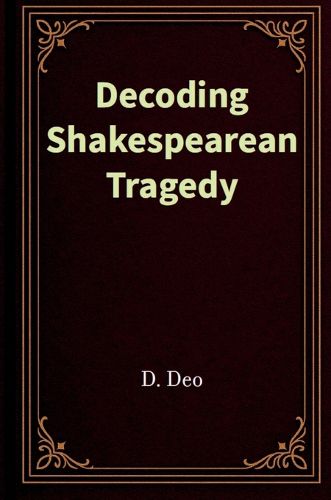Readings Newsletter
Become a Readings Member to make your shopping experience even easier.
Sign in or sign up for free!
You’re not far away from qualifying for FREE standard shipping within Australia
You’ve qualified for FREE standard shipping within Australia
The cart is loading…






This title is printed to order. This book may have been self-published. If so, we cannot guarantee the quality of the content. In the main most books will have gone through the editing process however some may not. We therefore suggest that you be aware of this before ordering this book. If in doubt check either the author or publisher’s details as we are unable to accept any returns unless they are faulty. Please contact us if you have any questions.
Decoding Shakespearean Tragedy is an ambitious literary and psychological exploration of the world's greatest dramatist through the lens of suffering, identity, ethics, and emotional truth. Traversing the terrain of Shakespeare's tragic imagination, the book offers a profound reexamination of how characters fall-not because they are evil or fated, but because they are painfully, beautifully human.
Divided into six meticulously structured parts, the book moves from classical frameworks of tragedy into the intimate recesses of the tragic psyche. It examines how Shakespeare weaves emotional breakdown, moral ambiguity, cognitive distortion, and social identity into the architecture of his greatest plays-Hamlet, Macbeth, King Lear, Othello, Romeo and Juliet, and more.
Through deep engagement with thinkers such as Aristotle, Freud, Jung, Belsey, Bloom, Fanon, Greenblatt, Nietzsche, and Nussbaum, this work brings together disciplines that are too often kept apart-literature, philosophy, ethics, psychology, postcolonial theory, and cultural studies. It explores how tragedy teaches empathy, not merely as emotion but as a form of moral insight; how soliloquies become windows into fragmented minds; and how Shakespeare crafts not just stories, but psychological blueprints of grief, guilt, ambition, desire, and despair.
From inner dialogue and madness to stereotyping, cognitive dissonance, and gendered power, the chapters uncover how Shakespeare anticipated the dilemmas of modern consciousness centuries before they were named. The book moves beyond the stage into the global and digital age, showing how tragedy lives on through cinema, postcolonial adaptation, virtual expression, and meme culture-forever evolving while remaining anchored in loss, love, and the limits of human control.
Decoding Shakespearean Tragedy ultimately invites readers not only to analyze, but to feel. It treats tragedy not as an academic relic but as a mirror for today's moral crises, political ruptures, and psychological wounds. It asks how Shakespeare still guides the soul-through the wreckage of reason and the ruins of power-and how tragedy, far from being despairing, becomes the ground from which clarity, compassion, and meaning rise.
$9.00 standard shipping within Australia
FREE standard shipping within Australia for orders over $100.00
Express & International shipping calculated at checkout
Stock availability can be subject to change without notice. We recommend calling the shop or contacting our online team to check availability of low stock items. Please see our Shopping Online page for more details.
This title is printed to order. This book may have been self-published. If so, we cannot guarantee the quality of the content. In the main most books will have gone through the editing process however some may not. We therefore suggest that you be aware of this before ordering this book. If in doubt check either the author or publisher’s details as we are unable to accept any returns unless they are faulty. Please contact us if you have any questions.
Decoding Shakespearean Tragedy is an ambitious literary and psychological exploration of the world's greatest dramatist through the lens of suffering, identity, ethics, and emotional truth. Traversing the terrain of Shakespeare's tragic imagination, the book offers a profound reexamination of how characters fall-not because they are evil or fated, but because they are painfully, beautifully human.
Divided into six meticulously structured parts, the book moves from classical frameworks of tragedy into the intimate recesses of the tragic psyche. It examines how Shakespeare weaves emotional breakdown, moral ambiguity, cognitive distortion, and social identity into the architecture of his greatest plays-Hamlet, Macbeth, King Lear, Othello, Romeo and Juliet, and more.
Through deep engagement with thinkers such as Aristotle, Freud, Jung, Belsey, Bloom, Fanon, Greenblatt, Nietzsche, and Nussbaum, this work brings together disciplines that are too often kept apart-literature, philosophy, ethics, psychology, postcolonial theory, and cultural studies. It explores how tragedy teaches empathy, not merely as emotion but as a form of moral insight; how soliloquies become windows into fragmented minds; and how Shakespeare crafts not just stories, but psychological blueprints of grief, guilt, ambition, desire, and despair.
From inner dialogue and madness to stereotyping, cognitive dissonance, and gendered power, the chapters uncover how Shakespeare anticipated the dilemmas of modern consciousness centuries before they were named. The book moves beyond the stage into the global and digital age, showing how tragedy lives on through cinema, postcolonial adaptation, virtual expression, and meme culture-forever evolving while remaining anchored in loss, love, and the limits of human control.
Decoding Shakespearean Tragedy ultimately invites readers not only to analyze, but to feel. It treats tragedy not as an academic relic but as a mirror for today's moral crises, political ruptures, and psychological wounds. It asks how Shakespeare still guides the soul-through the wreckage of reason and the ruins of power-and how tragedy, far from being despairing, becomes the ground from which clarity, compassion, and meaning rise.